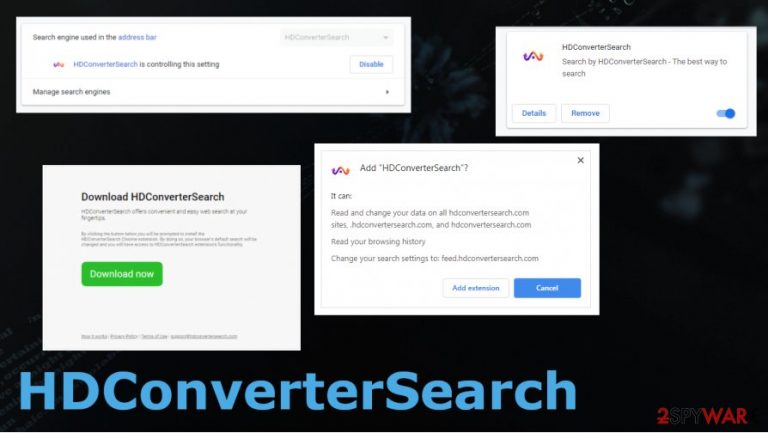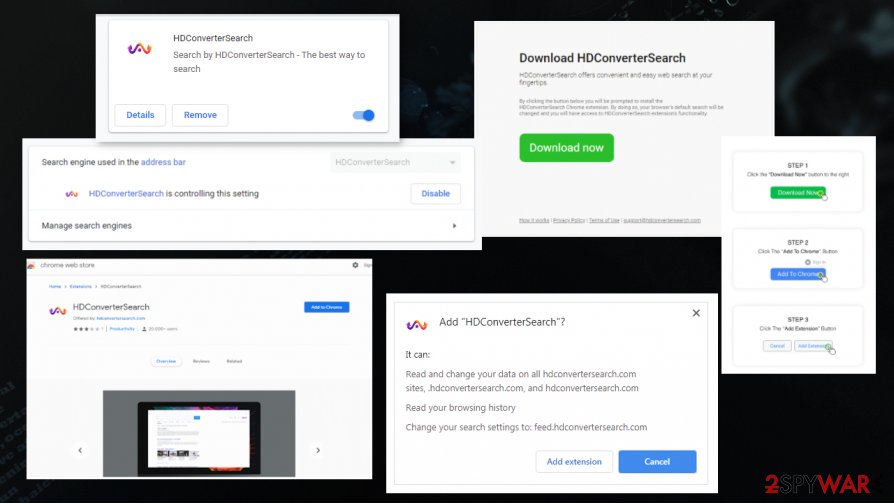HDConverterSearch (Removal Guide) - Free Instructions
HDConverterSearch Removal Guide
What is HDConverterSearch?
HDConverterSearch is the search hijacker that triggers unwanted changes in settings regarding the browsing activities

| Name | HDConverterSearch |
|---|---|
| Type | Browser hijacker |
| Issues | The program focuses on redirecting the online traffic, so the user is exposed to third-party commercial content and can trigger additional installs unwantedly and unknowingly |
| Symptoms | The web browser gets affected when the particular preferences and settings get manipulated by the PUP that runs in the background. When your default search engine is changed, you can be sure that the machine is affected by a hijack |
| Distribution | The program can be spread by other PUPs and from insecure sites or during shady freeware installation processes |
| Elimination | You should remove HDConverterSearch properly by running the AV tool that is designed to clear such intruders and other possibly dangerous threats |
| Repair | Recover from the damage that this PUP might leftover and run FortectIntego that can possibly find and fix affected files |
HDConverterSearch is the program that has been affecting users' browsing experiences because it alters settings and preferences to control visits and redirect people to sites of third-party sponsors. Settings of the search engine, address bar, homepage get affected at first, so your online searches display results injected with ads.
HDConverterSearch virus is called that because it manages to read and change data on associated sites, read your browsing history, and even track such details with the goal of sharing information with other companies. Your data might end up in the wrong hands, and such activities can lead to privacy issues or identity theft.
This data-tracking[2] and shady sharing behavior is one of the many reasons that should encourage you to perform HDConverterSearch removal as soon as possible. It might not be easy when the browser extension is the one that affects your machine and performance, but you have a few options.
Unfortunately, the installation process of the potentially unwanted program like this happens behind your back and cannot be easily controlled since the PUP developer that released this HDConverterSearch hijack relies on shady methods and software bundling. Experts[3] always talk about the risk that comes from downloading programs from the internet, but users still ignore red flags.

Remember that HDConverterSearch comes mainly as a web browser extension, so it gets added to the system by the developer without asking for proper permission. Once that is down, your machine is no longer working as it supposed to, so you experience unwanted symptoms.
Redirects, additional pop-up ads, banners, and search results injected with various hyperlinks to the malicious site indicates that the browser is affected. These intruders, like the HDConverterSearch add-on, can be persistent since the PUP manages to run in that background unnoticed. To clear all the files added behind your back – run FortectIntego or a similar cleaning tool and repair altered parts.

Browser hijackers and other potentially unwanted threats use different methods for the distribution
Potentially unwanted programs rely on deceptive methods that allow tricking people into installing useless tools and browser-based programs. There are various issues regarding such content because you can visit a malicious page or agree to install dangerous applications.
You need to rely on trustworthy programs and reliable sources that ensure secure downloads of the freeware. Also, you should always go for Advanced or Custom installation options, so all the pre-packed applications get seen, and you can uncheck suspicious ones yourself.
HDConverterSearch removal process needs to start as soon as possible
Make sure to run the anti-malware program once you notice the suspicious symptoms and try to find all the PUP traces to remove HDConverterSearch as soon as you notice changes. Any manipulations can affect the persistence and make it more difficult to clean the machine.
HDConverterSearch virus becomes annoying when PUP manages to run in the background for a while. You need an anti-malware tool that can find all the programs and annoying programs. Also, virus damage removal is important, so find a PC repair tool or cleaning application that could recover files and functions for you.
You may remove virus damage with a help of FortectIntego. SpyHunter 5Combo Cleaner and Malwarebytes are recommended to detect potentially unwanted programs and viruses with all their files and registry entries that are related to them.
Getting rid of HDConverterSearch. Follow these steps
Uninstall from Windows
The system should get properly cleaned after the process of HDConverterSearch removal
Instructions for Windows 10/8 machines:
- Enter Control Panel into Windows search box and hit Enter or click on the search result.
- Under Programs, select Uninstall a program.

- From the list, find the entry of the suspicious program.
- Right-click on the application and select Uninstall.
- If User Account Control shows up, click Yes.
- Wait till uninstallation process is complete and click OK.

If you are Windows 7/XP user, proceed with the following instructions:
- Click on Windows Start > Control Panel located on the right pane (if you are Windows XP user, click on Add/Remove Programs).
- In Control Panel, select Programs > Uninstall a program.

- Pick the unwanted application by clicking on it once.
- At the top, click Uninstall/Change.
- In the confirmation prompt, pick Yes.
- Click OK once the removal process is finished.
Delete from macOS
Remove items from Applications folder:
- From the menu bar, select Go > Applications.
- In the Applications folder, look for all related entries.
- Click on the app and drag it to Trash (or right-click and pick Move to Trash)

To fully remove an unwanted app, you need to access Application Support, LaunchAgents, and LaunchDaemons folders and delete relevant files:
- Select Go > Go to Folder.
- Enter /Library/Application Support and click Go or press Enter.
- In the Application Support folder, look for any dubious entries and then delete them.
- Now enter /Library/LaunchAgents and /Library/LaunchDaemons folders the same way and terminate all the related .plist files.

Remove from Microsoft Edge
Delete unwanted extensions from MS Edge:
- Select Menu (three horizontal dots at the top-right of the browser window) and pick Extensions.
- From the list, pick the extension and click on the Gear icon.
- Click on Uninstall at the bottom.

Clear cookies and other browser data:
- Click on the Menu (three horizontal dots at the top-right of the browser window) and select Privacy & security.
- Under Clear browsing data, pick Choose what to clear.
- Select everything (apart from passwords, although you might want to include Media licenses as well, if applicable) and click on Clear.

Restore new tab and homepage settings:
- Click the menu icon and choose Settings.
- Then find On startup section.
- Click Disable if you found any suspicious domain.
Reset MS Edge if the above steps did not work:
- Press on Ctrl + Shift + Esc to open Task Manager.
- Click on More details arrow at the bottom of the window.
- Select Details tab.
- Now scroll down and locate every entry with Microsoft Edge name in it. Right-click on each of them and select End Task to stop MS Edge from running.

If this solution failed to help you, you need to use an advanced Edge reset method. Note that you need to backup your data before proceeding.
- Find the following folder on your computer: C:\\Users\\%username%\\AppData\\Local\\Packages\\Microsoft.MicrosoftEdge_8wekyb3d8bbwe.
- Press Ctrl + A on your keyboard to select all folders.
- Right-click on them and pick Delete

- Now right-click on the Start button and pick Windows PowerShell (Admin).
- When the new window opens, copy and paste the following command, and then press Enter:
Get-AppXPackage -AllUsers -Name Microsoft.MicrosoftEdge | Foreach {Add-AppxPackage -DisableDevelopmentMode -Register “$($_.InstallLocation)\\AppXManifest.xml” -Verbose

Instructions for Chromium-based Edge
Delete extensions from MS Edge (Chromium):
- Open Edge and click select Settings > Extensions.
- Delete unwanted extensions by clicking Remove.

Clear cache and site data:
- Click on Menu and go to Settings.
- Select Privacy, search and services.
- Under Clear browsing data, pick Choose what to clear.
- Under Time range, pick All time.
- Select Clear now.

Reset Chromium-based MS Edge:
- Click on Menu and select Settings.
- On the left side, pick Reset settings.
- Select Restore settings to their default values.
- Confirm with Reset.

Remove from Mozilla Firefox (FF)
Remove dangerous extensions:
- Open Mozilla Firefox browser and click on the Menu (three horizontal lines at the top-right of the window).
- Select Add-ons.
- In here, select unwanted plugin and click Remove.

Reset the homepage:
- Click three horizontal lines at the top right corner to open the menu.
- Choose Options.
- Under Home options, enter your preferred site that will open every time you newly open the Mozilla Firefox.
Clear cookies and site data:
- Click Menu and pick Settings.
- Go to Privacy & Security section.
- Scroll down to locate Cookies and Site Data.
- Click on Clear Data…
- Select Cookies and Site Data, as well as Cached Web Content and press Clear.

Reset Mozilla Firefox
If clearing the browser as explained above did not help, reset Mozilla Firefox:
- Open Mozilla Firefox browser and click the Menu.
- Go to Help and then choose Troubleshooting Information.

- Under Give Firefox a tune up section, click on Refresh Firefox…
- Once the pop-up shows up, confirm the action by pressing on Refresh Firefox.

Remove from Google Chrome
You can find the extension with the same HDConverterSearch name added behind your back, so make sure to clear the web browser from any suspicious materials
Delete malicious extensions from Google Chrome:
- Open Google Chrome, click on the Menu (three vertical dots at the top-right corner) and select More tools > Extensions.
- In the newly opened window, you will see all the installed extensions. Uninstall all the suspicious plugins that might be related to the unwanted program by clicking Remove.

Clear cache and web data from Chrome:
- Click on Menu and pick Settings.
- Under Privacy and security, select Clear browsing data.
- Select Browsing history, Cookies and other site data, as well as Cached images and files.
- Click Clear data.

Change your homepage:
- Click menu and choose Settings.
- Look for a suspicious site in the On startup section.
- Click on Open a specific or set of pages and click on three dots to find the Remove option.
Reset Google Chrome:
If the previous methods did not help you, reset Google Chrome to eliminate all the unwanted components:
- Click on Menu and select Settings.
- In the Settings, scroll down and click Advanced.
- Scroll down and locate Reset and clean up section.
- Now click Restore settings to their original defaults.
- Confirm with Reset settings.

Delete from Safari
Remove unwanted extensions from Safari:
- Click Safari > Preferences…
- In the new window, pick Extensions.
- Select the unwanted extension and select Uninstall.

Clear cookies and other website data from Safari:
- Click Safari > Clear History…
- From the drop-down menu under Clear, pick all history.
- Confirm with Clear History.

Reset Safari if the above-mentioned steps did not help you:
- Click Safari > Preferences…
- Go to Advanced tab.
- Tick the Show Develop menu in menu bar.
- From the menu bar, click Develop, and then select Empty Caches.

After uninstalling this potentially unwanted program (PUP) and fixing each of your web browsers, we recommend you to scan your PC system with a reputable anti-spyware. This will help you to get rid of HDConverterSearch registry traces and will also identify related parasites or possible malware infections on your computer. For that you can use our top-rated malware remover: FortectIntego, SpyHunter 5Combo Cleaner or Malwarebytes.
How to prevent from getting browser hijacker
Access your website securely from any location
When you work on the domain, site, blog, or different project that requires constant management, content creation, or coding, you may need to connect to the server and content management service more often. The best solution for creating a tighter network could be a dedicated/fixed IP address.
If you make your IP address static and set to your device, you can connect to the CMS from any location and do not create any additional issues for the server or network manager that needs to monitor connections and activities. VPN software providers like Private Internet Access can help you with such settings and offer the option to control the online reputation and manage projects easily from any part of the world.
Recover files after data-affecting malware attacks
While much of the data can be accidentally deleted due to various reasons, malware is one of the main culprits that can cause loss of pictures, documents, videos, and other important files. More serious malware infections lead to significant data loss when your documents, system files, and images get encrypted. In particular, ransomware is is a type of malware that focuses on such functions, so your files become useless without an ability to access them.
Even though there is little to no possibility to recover after file-locking threats, some applications have features for data recovery in the system. In some cases, Data Recovery Pro can also help to recover at least some portion of your data after data-locking virus infection or general cyber infection.
- ^ Potentially unwanted program. Wikipedia. The free encyclopedia.
- ^ Arwa Mahdawi. Targeted ads are one of the world's most destructive trends.. Theguardian. Opinions and news.
- ^ Virusai. Virusai. Spyware related news.
